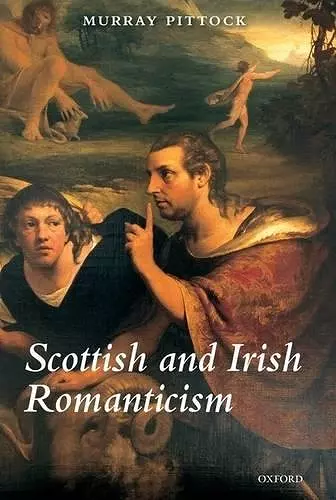Scottish and Irish Romanticism
Format:Hardback
Publisher:Oxford University Press
Published:24th Jan '08
Currently unavailable, and unfortunately no date known when it will be back
This hardback is available in another edition too:
- Paperback£53.00(9780199692200)

Scottish and Irish Romanticism is the first single-author book to address the main non-English Romanticisms of the British Isles. Murray Pittock begins by questioning the terms of his chosen title as he searches for a definition of Romanticism and for the meaning of 'national literature'. He proposes certain determining 'triggers' for the recognition of the presence of a national literature, and also deals with two major problems which are holding back the development of a new and broader understanding of British Isles Romanticisms: the survival of outdated assumptions in ostensibly more modern paradigms, and a lack of understanding of the full range of dialogues and relationships across the literatures of these islands. The theorists whose works chiefly inform the book are Bakhtin, Fanon and Habermas, although they do not define its arguments, and an alertness to the ways in which other literary theories inform each other is present throughout the book. Pittock examines in turn the historiography, prejudices, and assumptions of Romantic criticism to date, and how our unexamined prejudices still stand in the way of our understanding of individual traditions and the dialogues between them. He then considers Allan Ramsay's role in song-collecting, hybridizing high cultural genres with broadside forms, creating in synthetic Scots a 'language really used by men', and promoting a domestic public sphere. Chapters 3 and 4 discuss the Scottish and Irish public spheres in the later eighteenth century, together with the struggle for control over national pasts, and the development of the cults of Romance, the Picturesque and Sentiment: Macpherson, Thomson, Owenson and Moore are among the writers discussed. Chapter 5 explores the work of Robert Fergusson and his contemporaries in both Scotland and Ireland, examining questions of literary hybridity across not only national but also linguistic borders, while Chapter 6 provides a brief literary history of Burns' descent into critical neglect combined with a revaluation of his poetry in the light of the general argument of the book. Chapter 7 analyzes the complexities of the linguistic and cultural politics of the national tale in Ireland through the work of Maria Edgeworth, while the following chapter considers of Scott in relation to the national tale, Enlightenment historiography, and the European nationalities question. Chapter 9 looks at the importance of the...
It is difficult to do justice in a short review to a work of the depth and complexity of Scottish and Irish Romanticism ... this magisterial, intricate book is an important and nuanced challenge to the postwar version of literary Romanticism. * Jane Moore, Estudios Irlandeses *
what has been put forth here concerning Scottish and Irish Romanticism has been singularly well established... Undoubtedly, no one will be able to speak to this subject or the Scots and Irish authors included here without conceding and being grateful for such definitive work on the subject as Scottish and Irish Romanticism. I know that I shall return to this book repeatedly, and I urge all partisans of all nations of Romanticism to do likewise * Laura Dabundo, Wordsworth Circle *
ambitious ... a major contribution to Romantic studies as well as Scottish and Irish scholarship * Fiona Stafford, Eighteenth-Century Scotland *
a powerful book. Dams that have long kept the Lakeland valleys safe and dry are here overwhelmed. Pittock has opened up the study of Romanticism in the British Isles in ways that recent champions of an array of marginalised writers and topics have not. This is a book that throws open the windows and unlocks the doors. * Alan Rawes, Studies in Hogg and His World *
...unusually nuanced * Modern Language Review *
The book manages to bring off a number of interesting and even impressive feats...Pittock succeeds with verve, directness and acumen...What will have to be faced, following Pittock's opening up of the field, is a properly comparative analysis * Joep Leerssen, Journal of Irish and Scottish Studies *
Thought-provoking ... concludes that dialogue across cultural difference is the way forward * Forum for Modern Language Studies *
An outstanding contribution. The book's comparative reach sets it apart and confirms the leading role that Murray Pittock has played in the reorientation of British literary studies. Indispensable reading. * SLR *
As good as it gets you may have to dig a little harder with this book but you will be rewarded over and over. Pittock has succeeded in his quest to move Scottish and Irish literature back into the academic arena. Wow! What a masterpiece. * Electric Scotland *
Pittock's Scottish and Irish Romanticism makes the most concerted attempt to reclaim Romanticism as a project, a cultural politics, within the expanded field of an archipelagic or four-nations historiography. * MLQ *
this book will be a stimulating read for Irish Studies scholars * BARS Bulletin and Review *
an important addition to the growing field of British Isles Romanticism 'fratriotism' and this promises to be an epithet that will gain significant critical currency in future years ... deserves special praise ... a groundbreaking discussion of formative Scottish and Irish involvement in the liberation struggles of colonised nations across the globe. In their response to the tour de force that is Scottish and Irish Romanticism, readers might be forgiven for thinking that both the wealth of new context material in evidence here and Pittock's desire to restore critical reputations would suggest that there were actually two separate, if equally important, books to be found in this study: one on Romantic precursors and one on fratriotism. And yet it is entirely to the author's credit that this exciting and energetic monograph manages to sustain its dual interests throughout with ease, wit and confidence. * Irish Studies Review *
ISBN: 9780199232796
Dimensions: 240mm x 164mm x 21mm
Weight: 603g
306 pages